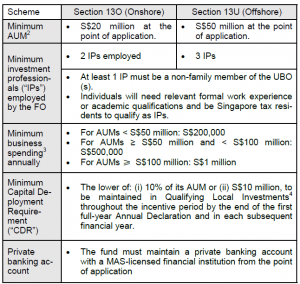Single-Family Office VS Private Investment Company
Introduction
The onshoring of funds in Singapore provides a choice of various structures: this article discusses the difference between a single-family office structure and a private investment company.
Both options enable investors to consolidate their assets, diversify their portfolios and manage their assets more efficiently. Utilising private limited companies, the structures limit a shareholder’s liability to the share capital subscribed in the companies. Additionally, while Singapore does not have a capital gains tax, trading gains (short-term profit-seeking transactions) are taxable through the single-tier tax regime at 17% corporate tax and no further tax on dividends.
Single-Family Office
In recent years, Singapore has become a hub for family offices, attracting several renowned ultra-high-net-worth individuals, with more than 1,00 family offices established in Singapore by the end of 2022[1].
A single-family office structure comprises of a fund company and a fund management company. The fund company holds monies from a single family and enters into an investment management agreement with the fund management company, wherein the fund management company is engaged to provide investment services for the former. Depending on the specific structure used, the fund management company can qualify for an exemption from a capital market services license, which is typically required to conduct activities regulated under the Securities and Futures Act 2001.
The family office landscape is supported by the Singapore government, with tax incentives schemes available for fund companies under Section 13O and Section 13U of the Singapore Income Tax Act, which provides a tax exemption on Specified Income from Designated Investments upon approval of the application. The tax incentive schemes have several requirements, as summarised in the following table:

The fund management company is an operating company which receives income from the annual Investment Management Fee paid by the fund company as part of the latter’s local business spending requirement. The fund management company can apply for Employment Passes for its Investment Professionals. Beneficial owners of a family office structure, as well as their family members (subject to conditions), would thus be able to apply for Employment Passes in Singapore.
Accordingly, the single-family office structure serves dual functions: the investments in the fund company can be tax exempted under the tax incentive scheme, while the requirements of the tax incentive scheme, such as local business spending and minimum AUM size, provide complimentary factors for the fund management company to justify the employment of Employment Pass holders.
Private Investment Company
Where residency is the primary goal in Singapore and you are not yet prepared to commit to meeting the economic requirements of the Section 13O or 13U schemes, another option is to set up a private investment company to hold your assets and investments in Singapore and apply for an Employment Pass under the private investment company. Unlike a family office structure under the tax incentive schemes detailed above, a private investment company is not exempted from the corporate tax of 17% and does not have any local business spending, minimum AUM, or capital deployment requirements. Instead, the company can independently, through private bankers or with the help of external asset managers, carry out investments. An individual may also obtain an Employment Pass to take up the role of an asset manager or like.
While no minimum AUM requirements apply to a private investment company, the company needs to have sufficient business and revenue to justify paying the salaries of its Employment Pass holders. Renewal of Employment Passes under the company is contingent on the company’s ongoing business and ability to support its expenditure.
In sum, a private investment company is a simple way to start managing assets and obtain an Employment Pass in Singapore.
Summary
Whether through a single-family office structure or a private investment company, investors can onshore their assets in Singapore and gain residency in Singapore through an Employment Pass under their company. In turn, Employment Pass holders can apply for Dependent Passes and Long-Term Visit Passes for their spouse, children, and parents upon meeting the minimum salary requirements.
With the Section 13O and 13U schemes, Singapore also offers a single-family office structure to be exempted from income tax on specified income for the life of the fund, subject to the fund meeting the relevant conditions of the scheme.
We are experienced in the setup of these entities in Singapore and provide the full suite of services from incorporation to annual maintenance of these companies. If you are interested in setting up a single-family office or a private investment company or would like to start a conversation on your plans in Singapore, please feel free to contact our Business Development team to arrange a meeting with us.
[1] https://www.mas.gov.sg/development/wealth-management
[2] AUM refers to the Net Asset Value oof Designated Investments based on accounting convention, calculated at the end of the fund’s financial year.
[3] According to accounting principles. Expenses incurred should relate to the operating activities of the fund. Typical expenditure includes, but are not limited to, remuneration, management fees, tax advisory fees, and operating costs. Expenses such as taxes, penalties, or expenses relating to financing activities are excluded.
[4] See full list of Qualifying Local Investments.
